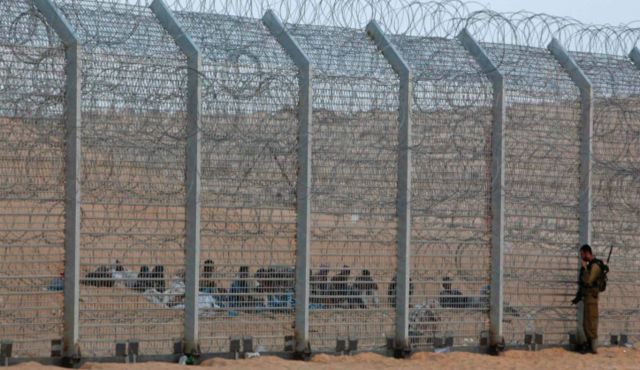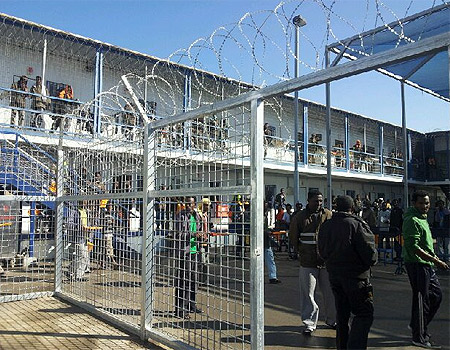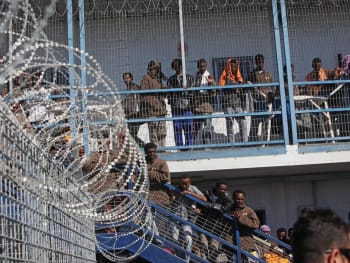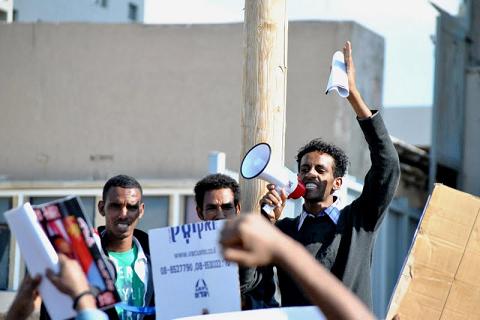QUOTE
Eritrean migrants tell of IDF violence at Israel-Egypt border
Testimonies suggest that the men who had been trapped at the Israeli-Egyptian border for 8 days were tear gassed, forcefully dragged into Egyptian territory.
For the first time since they were allowed into Israel, the three Eritrean migrants who were held at the border with Egypt along with 18 others for over a week, served affidavits claiming that the IDF used physical force as well as tear gas against the migrants. The two women and one 14-year-old boy were sent to Saharonim Prison in the Negev after being allowed to enter the country.....
From the third affidavit, which was given separately,
it was revealed that Israeli security forces which
crossed the fence into the Egyptian side “used force,
held them physically and pushed them onto a tarp which
was dragged over to the Egyptian side.”
UNQUOTE
Saharonim Concentration Camp is run by Israeli thugs. It is less
luxurious than Auschwitz.

Blacks do not get huts or even tents. [ Wrong, see other pictures but it is
still not a fun place. ] The barbed
wire is higher than
Auschwitz.
Saharonim Concentration Camp

There are plenty of them.
Israel's Five Year War On African Migrants
QUOTE
From building a new border fence to setting up the
world's largest detention facility for asylum seekers,
Israel's government has tried a number of different
strategies designed to keep African migrants out.
UNQUOTE
How awful. Jews like immigration when we are at the receiving end.
Could they possibly be hypocritical liars trying to destroy civilization?
Israel's five-year war on African migrants
[ 4/06/2012 ]

Israeli Concentration Camp Over Crowded With Blacks -
http://www.haaretz.com/print-edition/news/haaretz-special-report-israeli-jail-grappling-with-rising-swell-of-illegal-african-immigrants-1.397366
QUOTE
Haaretz special report: Israeli jail
grappling with rising swell of illegal African immigrants
Almost 3,000 Africans are held at the Saharonim detention center, with
hundreds crossing over into Israel every day.

Africans sitting in the Saharonim
detention center earlier this week.
Photo by Eliyahu Hershkovitz
The commander of the Saharonim detention center, which holds
foreigners who have fled their homes in Africa, crossed Sinai and
entered Israel illegally, notes that "hundreds come every day;
others are released or deported. The difficult decisions are not
made at my desk," says Shimon Bibas, commander of the Negev
facility. "We simply do the job as best we can."
For the past three years, Bibas has been in charge of one of the most controversial, and least known, facilities in the country. The media has never been allowed inside before, despite repeated requests.
At Saharonim everyone who enters the country illegally in the south is detained; some are persecuted asylum-seekers and victims of rape and torture, some are labor migrants trying their luck in Israel. There, fates are decided: Who will be released into Israel, and who will be deported?
The noise of the construction of the new wing at Saharonim leaves no room for doubt: Israel cannot keep up with the wave of migration. When Saharonim was built in 2004, it had a capacity of a few hundred. Now almost 3,000 are housed there at any given time.
The ritual is constant: the people cross the borders and are caught by an Israel Defense Forces patrol: men, women, children, babies - they are all sent to Saharonim.
A slow walk along the paths of the compound reveals small rooms, each with its own sign: court, tribunal, questioning. A whole bureaucracy operating for years in a closed complex.
Attorney Omer Shatz of the human rights group Anu Plitim (We are Refugees ), says the tribunal at Saharonim "cannot be considered a court, certainly not one that rules on the freedom of asylum-seekers. The best evidence of this is the fact that these tribunals are located inside a prison, far from the public eye." Its judges, he says, are not subservient to the Judicial Ombudsman, "and as opposed to criminals, who are allowed a public defender, these victims come before the tribunal without representation."
Bibas would not allow visitors to enter the wing where minors were housed. "I am careful about taking you to a closed place due to health concerns," he said. In so doing, he locks the door on the greatest failure the prisons service has to deal with: Some 15 unaccompanied minors are housed in this separate wing at Saharonim, although a separate facility for incarcerated minors was opened following rulings of the High Court and work in the Knesset. The facility, known as Matan (a Hebrew acronym for the words "youth support center" ), was opened by the Israel Prisons Service so that children would not have to be held in a prison with adults. But Matan can hold only 60 children, and it is full almost to capacity all the time.
As far as the minors at Saharonim are concerned, "sometimes I ask a child who comes up to my waist how old he is, and he'll say 18," Bibes says. "They know that if they are minors they won't be let out to work, so they try to lie," he adds.
A source familiar with the situation said that even determination of a child's age takes a very long time - weeks and sometimes months - because there is only one physician in the whole country who deals with the matter.
There are 200 inmates in Wing 5 at Saharonim, passing the time in the afternoon sun, outside the tents where they live. Five Eritreans are playing dominoes and at the nearby makeshift volleyball court another game has started. Others are waiting next to the common washing machine.
A question about abuse in Sinai draws a group of interested inmates. Not many words are necessary. One of the inmates calls a friend, and lifts up his shirt. "Look here. And here," he says, showing the scars under his clothing. "It's from there," he says.
A source familiar with the details said on Wednesday that Saharonim lacked medical treatment for the victims of physical or mental abuse in Sinai. There are not enough social workers, either, the source said, and the help a prisons service social worker can give is not enough.
Inside a big tent in the center of the courtyard are three television screens with a group of viewers gathered at each. "There's an Eritrean, a Sudanese and an Ethiopian channel," Bibas says. "Everybody watches the news from his home country."
Bibas points to benches, which are affixed to the asphalt ground. "That's so they don't start flying if a brawl starts. That, for example, is the reception the justice minister got when he came," Bibas says.
Bibas says his staff has learned to differentiate among the groups. "The Sudanese think a lot of themselves and they are physically strong; then come the Ethiopians and then the Eritreans." A riot can start over one cigarette, according to Bibas.
A few Eritreans are standing in lines for the public phones. This is the only way for them to talk to family or friends who have made it to Tel Aviv. It is also the only way for them to talk to human rights groups that will provide them with legal aid. "I talk to my cousin every day or two; he is waiting for me, says Aron from Eritrea, who has been at Saharonim for a week now.
A few steps away from Wing 5 is the women's wing. In the center of its courtyard, among many tents, is a large playground with children running around.
Rosamund Osai, from Ghana, is in charge of various tasks, including handing out toilet paper. "I've been here for two years already," she says in fluent English. "I hand out toilet paper, receive the new girls and help arrange the women for the morning count," she says. A relative who came with her has already been released, she says. "I want to get out of here and go somewhere, she says, with a look of despair. I have a lawyer. I left my children in Ghana," she says.
The babies tent is the only one that received permission to install a heater, Bibas says, checking the temperature. "You can see their kindergarten, over there in the corner," he says, pointing to a small prefab. Its walls are decorated with pictures drawn by Mateus, Joey, Amos and Anai. But now a woman is sitting there. She has just arrived today and is being questioned by a social worker.
Anat Litvin, who heads the prisoners department of Physicians for Human Rights, says Saharonim has no gynecological clinic. "This population doesn't know the term, but many of them have been sexually abused on their way to Israel and therefore access is so important," Litvin says.
Human rights groups have recently petitioned the High Court of Justice against the prisons service and the Public Security Ministry to allow inmates full access to suitable gynecological treatments at Saharonim.
Litvin says inmates have trouble getting in touch with human rights groups. "They come into the country and go straight to the prisons service, which does not identify to any depth victims of trafficking, rape and abuse, or trauma in general," she says. Litvin adds that the prisons service turns down their offers of help, although the European Parliament has mandated that human rights workers be allowed free access to facilities for asylum-seekers and labor migrants.
"The solution should be system-wide, and not all on the shoulders
of the prisons service," Litvin says.
UNQUOTE
Adolf showed them the way, didn't he?
How Much Is My Sister's Kidney
or see -
http://www.jewishjournal.com/jewrnalism/item/how_much_is_my_sisters_kidney_/

Organjacking is a big money business. The customers
are eager or dead. The donors are desperate as well. They might even get paid.